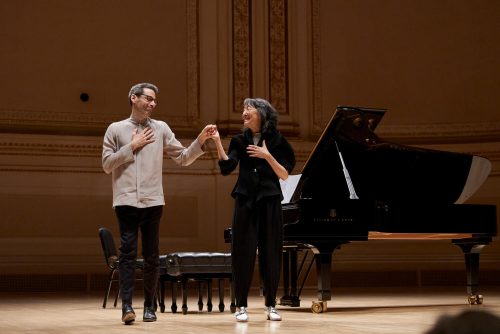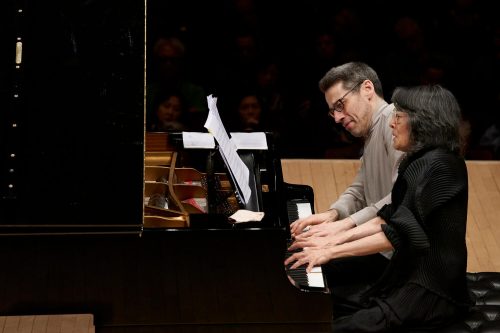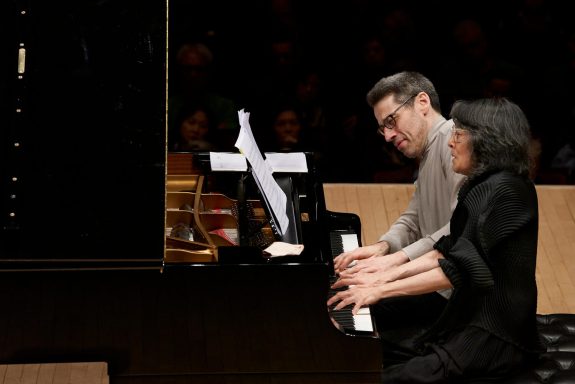 United States Schubert: Dame Mitsuko Uchida (piano), Jonathan Biss (piano). Union College Memorial Chapel, Schenectady, New York, 7.4.2024. (ES-S)
United States Schubert: Dame Mitsuko Uchida (piano), Jonathan Biss (piano). Union College Memorial Chapel, Schenectady, New York, 7.4.2024. (ES-S)

Schubert – Allegro in A minor, ‘Lebensstürme’, D.947; Grande Marche No.5 in E-flat minor, D.819; Rondo in A major, D.951; Divertissement à la hongroise in G minor, D.818
The sober yet warm atmosphere of the Union College Memorial Chapel in Schenectady, located in New York State’s Capital Region, has been a wonderful venue for chamber music concerts for many years. Under the umbrella of ‘Capital Region Classical’, an annual series meticulously curated by Artistic Director Derek Delaney, interpreters of the highest caliber from all corners of the world share their insights with a dedicated and eager audience. Two of these esteemed musicians, Dame Mitsuko Uchida and Jonathan Biss, are currently on tour, presenting four-hand piano works by Schubert. Schenectady was fortunate to be one of their stops, just two days before their performance at Carnegie Hall, much to the delight of the audience in the Memorial Chapel on a balmy Sunday afternoon.
Amid the vastness of Schubert output, which is immense given his young age when he died, the four-hand piano compositions remain unjustly quasi-unknown. Considering their wealth of exquisite musical details, presenting these compositions to the public becomes a truly commendable act of restoration. Moreover, Jonathan Biss, an exceptionally articulate writer on classical music, provided program notes that were charmingly written and included many important details about the circumstances in which these musical gems were conceived.
Written in May and June 1828, just months before the composer’s death, the Allegro in A minor and the Rondo in A major are often considered by critics to be movements of the same sonata. This is viewed either as a two-part sonata or a more extended one, whose additional parts were never composed. Nevertheless, Biss and Uchida chose to treat them as separate entities, inserting an earlier work, the Grande Marche No.5 between them. The latter, a quite lengthy funeral march, is imbued with bleakness, each step drawing an unknown character nearer to an inescapable end. Particularly in its middle section, the music is rich with wonderful and surprising modulations, which the two pianists, always perfectly in sync, emphasized with clarity.

Performed by Biss (on the right side of the keyboard) and Uchida, the Allegro served as eloquent proof that the celebrated Fantasia in F minor was not the sole outstanding four-hands piece for piano composed by Schubert in 1828. Given the catchy Romantic heading ‘Lebensstürme’ (‘Storms of Life’) by Anton Diabelli, who published the score decades after Schubert’s death, the piece contrasts a turbulent beginning with the unfathomable serenity of a second subject. As Biss characterized it, the ‘lonely utopia’ was visited three times, each appearing more distant, while the anxiety present from the first bars seemed to intensify over time. The two pianists, currently co-directors of the famed Marlboro Festival in Vermont, demonstrated a high level of understanding of the other’s intentions during the meandering development. Meanwhile, surprising caesurae became moments brimming with tension, further enhancing the overall angst.
The Rondo in A major might have interjected a hint of optimism in the program but, nonetheless, the music was engulfed in unmitigated melancholy. As in the Allegro, the two pianists never rushed the unfolding statements of ‘heavenly length’, drawing constant attention to the wealth of melodic material, Uchida tempering any over-effusive attempts by her partner.
After the interval, the two performers switched positions, with Uchida taking over the Primo part in the Divertissement à la hongroise. Despite its title, this substantial piece transcends mere light entertainment. The work, a march framed by two modified rondos, experiences some longueurs, yet it offers instants of great beauty, especially when the focus shifts away from the pervasive sadness. During these few moments of respite, one marveled at the airy modulations, conjured by Uchida’s knowing smile and nimble fingers. A grim fate seemed, if only for a few seconds, more tolerable.
The duo played one encore: the Sonatina from Bach’s Cantata BWV 106, ‘Gottes Zeit ist die allerbeste Zeit’ (‘Actus Tragicus’) as transcribed by Kurtág György. This funeral music is imbued with sadness but also hope, a quality present in many of Schubert’s compositions, albeit quite absent in the ones heard on this occasion.
Edward Sava-Segal
